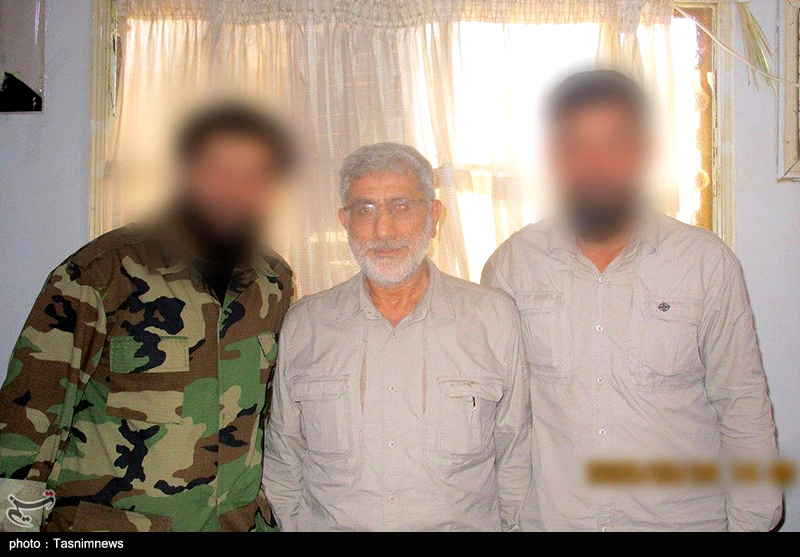On January 3 (January 2 U.S. time), the United States killed Qassem Soleimani, commander of the elite Qods Force, in a drone strike in Iraq. One day after Soleimani’s death, Supreme Leader Ayatollah Ali Khamenei announced that Esmail Ghaani, deputy commander of the Qods Force, would replace him. Khamenei said that the mission of the external operations branch of the Revolutionary Guards “will be unchanged from the time of his predecessor.” Khamenei referred to Ghaani as “one of the most prominent commanders” in Iran’s military.
Ghaani has promised retaliation for Soleimani’s assassination. “Certainly actions will be taken,” he said. “We promise to continue down martyr Soleimani’s path as firmly as before with help of God, and in return for his martyrdom we aim to get rid of America from the region,” he said on January 6.
Ghaani has kept a low profile and rarely granted interviews. Conflicting details about his life have been published. Ghaani was reportedly born on August 8, 1957, in the northeastern city of Mashhad. He did not play a prominent role in the 1979 revolution. “I was present like the rest of the people,” he said in a rare 2015 interview. But he did join the Islamic Revolutionary Guard Corps in 1980. Ghaani received 35 days of training at Imam Ali Officers' Academy in Tehran at the start of his military career.
Ghaani was first deployed to Iran’s Kurdistan province to help put down a Kurdish uprising after the fall of the shah. When Iraq invaded Iran in 1980, Ghaani joined the frontlines as a division commander. He led the 5th Nasr Brigade and 21st Imam Reza Armored Brigade during the eight-year war.
In March 1982, Ghaani met Soleimani while fighting on the southern front. Ghaani said that the tribulations of combat forged a bond between he and Soleimani. “We are war comrades, and it was the war that made us friends...Those who become friends at times of hardship have deeper and more lasting relations than those who become friends just because they are neighborhood friends,” Ghaani said. During the war, Ghaani also befriended Khamanei, who often visited 5th Nasr Division on the frontlines. Khamenei later described Ghaani as one of the “most decorated commanders” in the Iran-Iraq War, known in Iran as the “Holy Defense.”
After the war, Ghaani joined the Qods Force, the IRGC’s elite unit specializing in foreign military operations, when it was established in 1988. He was stationed in Khorasan Province on the border of Afghanistan and Turkmenistan. In Khorasan, Ghaani helped combat drug cartels infiltrating Iran from Afghanistan. He also established connections with Afghanistan’s Northern Alliance, a coalition fighting against the rule of the Taliban.
Within the Qods force command, Ghaani focused on strategic priorities east of Iran, such as Afghanistan and Pakistan. Soleimani focused on the countries to the west of Iran. Ghaani also had more of an administrative role that complemented Soleimani’s focus on foreign military operations. He oversaw the organization’s domestic section, including logistics and coordination between different branches.

According to an Afghan governor, Ghaani once posed as Iran’s deputy ambassador to Kabul and visited his province to oversee the construction of an Iranian-funded hospital in 2018. Afghanistan’s foreign ministry said the government would investigate Ghaani’s diplomatic activities.
In 1997, IRGC Chief Commander Rahim Safavi appointed Ghaani as Deputy Commander of the Qods Force under Soleimani. In that role, Ghaani oversaw financial disbursements to Iran’s proxies, including Hezbollah. Ghaani also may have facilitated Qods Force operations in Africa and South America. He accompanied President Mahmoud Ahmadinejad on a trip to the two continents in November 2009.
Ghaani facilitated a large IRGC weapons shipment to The Gambia, which was seized by Nigeria in October 2010, according to the U.S. Treasury Department. Israeli officials alleged that the shipment was ultimately bound for militants in the Gaza Strip.
Ghaani also played a role in Iran’s intervention in Syria’s civil war, which broke out in 2011. He was the first IRGC commander to publicly acknowledge Iran’s role in the Syrian Civil War. “Thanks to Iran's presence in Syria -- physically and nonphysically -- big massacres were prevented...if the Islamic republic had not been present in Syria, the massacre of its people would have been multiplied,” he told Iranian Students News Agency in 2012. In 2013, Ghaani and the IRGC began recruiting Afghan Shiites to fight in the new Fatemiyoun militia on behalf of Syrian President Bashar al Assad.

In June 2020, Tasnim News Agency reported that Ghaani had recently visited Albukamal, Syria, but later took down the story
The United States has taken an interest in Ghaani since at least 2012. On March 27, 2012, the U.S. Treasury Department listed Ghaani as a Specially Designated National for facilitating financial disbursements and weapons shipments to terrorist groups. “Ghani's authority covers IRGC-QF financial disbursements to IRGC-QF elements, including elements in Africa, as well as to various terrorist groups, including Hizballah. As Deputy Commander, Ghani had financial oversight of the IRGC-QF weapons shipment that was intended for The Gambia,” the Treasury said.
Photo Credit: Vahid Ahamdi for Tasnim News (CC BY 4.0); Ghaani in Syria via Tasnim News (CC BY 4.0)
